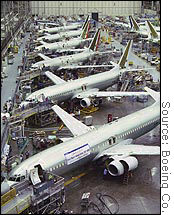NEW YORK (CNN/Money) -
The head of Boeing Co.'s commercial aircraft division has angered the company's largest union in the middle of contract negotiations with comments about the world's largest aircraft maker not needing to recall laid-off employees when demand for passenger jets returns.
Alan Mulally, CEO of Boeing Commercial Airplanes, was quoted in the Chicago Tribune as saying that the company in the future is going to produce more airplanes with fewer workers and that the 30,000 employees of his division laid off after the Sept. 11 terrorist attack may never be recalled. Mulally also said that the International Association of Machinists and Aerospace Workers, which has seen 18,000 members out of nearly 44,000 members at Boeing laid off in that cutback, was on board with the cuts.
 |
|
| The Boeing 737 assembly plant in Renton, Wash. The machinists' union is challenging a management contention that employees laid off after 9/11 should not be recalled when demand for jets increases. |
"The union is absolutely aligned and attuned with the same thing," he said in the Tribune article. "What we decide together has got to help Boeing be more competitive going forward. Because if we don't come out of this by making progress, we will hurt everyone."
But the union, whose members recently overwhelmingly approved a possible strike if a new contract is not reached by the Sept. 1 contract expiration, said that Mulally is wrong and that job security is a top issue for the union.
"If Alan Mulally thinks the IAM is in tune with that idea, he must be tone deaf," said a statement from Dick Schneider, the union's chief negotiator. "Anyone who has been listening to the IAM membership or to this union must understand, job security is the single most important issue in this contract. Certainly, any Boeing official hoping to reach an agreement with the IAM should have no illusions about that point."
Chuck Cadena, a Boeing spokesman, wouldn't comment directly on the IAM statement. But he told CNN/Money that it is inhumane to affected employees to have employment levels fluctuate with the boom and busts of demand for aircraft.
"We would like to keep our employment stable and not go back into the hiring and firing binges that have been typical of the industry," said Cadena. "We know it wreaks havoc on employees' lives."
| |
 Related stories
Related stories
| |
| | |
| | |
|
Cadena would not say how many or when employees who were laid off might be recalled as demand for aircraft returns, saying that demand for aircraft would determine that. But he said Boeing would do everything it could to deal with any increased demand with greater productivity rather than higher employment levels. He said this is an issue that the company will work with the union to resolve.
"How we reach an agreement, we don't have all the answers," said Cadena. "We have to work that out with them. The broader issue of job security will be part of the conversation."
The union struck Boeing for 48 days in 1989 and for 69 days in 1995. During the next negotiations in 1999 it reached a negotiated settlement that included a 10 percent ratification bonus and average pay increases totaling 11.5 percent over the three years of the contract. That is the contract due to expire Sept. 1.
Click here for a look at aerospace and defense stocks
Shares of Boeing (BA: up $0.14 to $38.67, Research, Estimates), a component of the Dow Jones industrial average, were little changed in mid-afternoon trading Tuesday.

|

